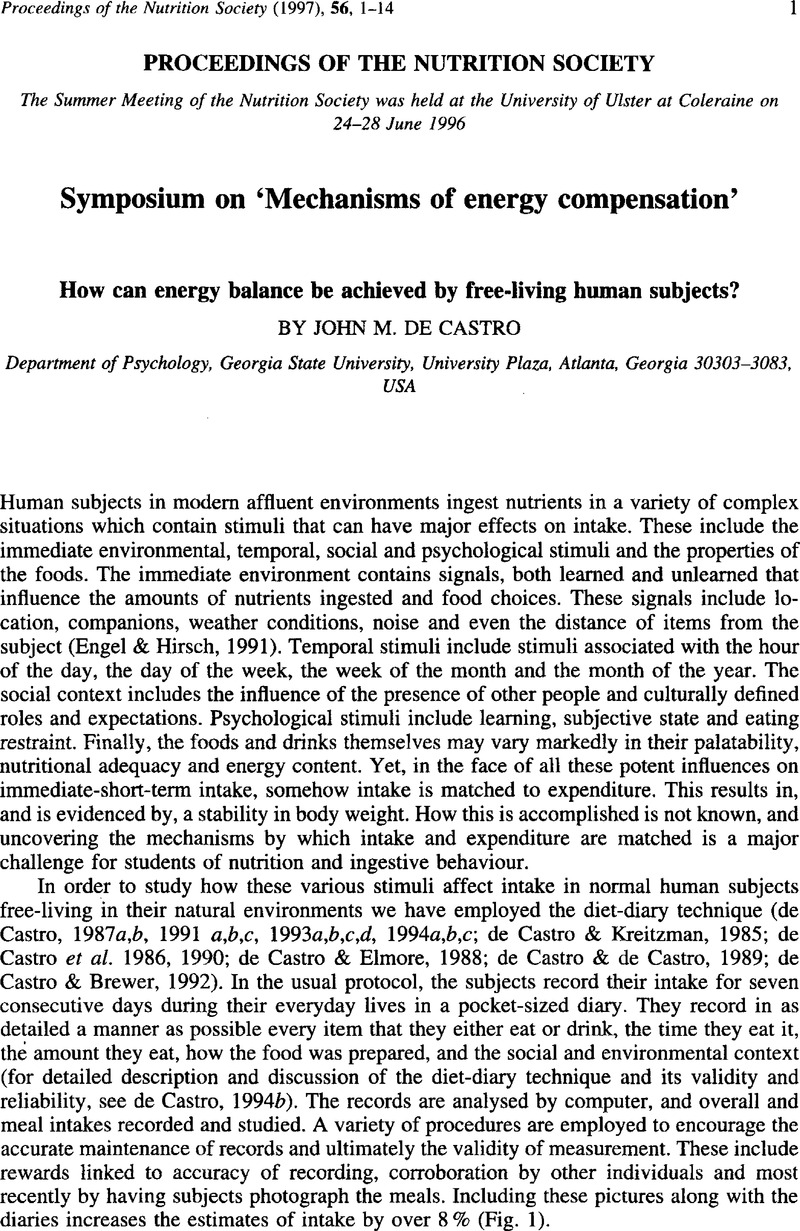Crossref Citations
This article has been cited by the following publications. This list is generated based on data provided by Crossref.
King, Nail A.
1998.
The relationship between physical activity and food intake.
Proceedings of the Nutrition Society,
Vol. 57,
Issue. 01,
p.
77.
Macdiarmid, Jennie
and
Blundell, John
1998.
Assessing dietary intake: Who, what and why of under-reporting.
Nutrition Research Reviews,
Vol. 11,
Issue. 2,
p.
231.
Millward, D. Joe
and
Wijesinghe, D. G. N. G.
1998.
Energy partitioning and the regulation of body weight – Reply by Millward & Wijesinghe.
British Journal of Nutrition,
Vol. 79,
Issue. 1,
p.
111.
de Castro, John
1999.
Neural and Metabolic Control of Macronutrient Intake.
de Castro, John M.
1999.
What are the major correlates of macronutrient selection in Western populations?.
Proceedings of the Nutrition Society,
Vol. 58,
Issue. 4,
p.
755.
BLUNDELL, JOHN E.
and
KING, NEIL A.
1999.
Physical activity and regulation of food intake: current evidence.
Medicine & Science in Sports & Exercise,
Vol. 31,
Issue. Supplement 1,
p.
S573.
James Stubbs, R
and
O’Reilly, Leona
1999.
Neural and Metabolic Control of Macronutrient Intake.
Sheehan, Laurie A
and
Macallan, Derek C
2000.
Determinants of energy intake and energy expenditure in HIV and AIDS.
Nutrition,
Vol. 16,
Issue. 2,
p.
101.
Mathey, Marie-Françoise A.M
Zandstra, Elizabeth H
de Graaf, Cees
and
van Staveren, Wya A
2000.
Social and physiological factors affecting food intake in elderly subjects: an experimental comparative study.
Food Quality and Preference,
Vol. 11,
Issue. 5,
p.
397.
Stubbs, R.J.
Whybrow, S.
and
Blundell, J.E.
2005.
Encyclopedia of Human Nutrition.
p.
154.
Stubbs, R. J.
and
Tolkamp, B. J.
2006.
Control of energy balance in relation to energy intake and energy expenditure in animals and man: an ecological perspective.
British Journal of Nutrition,
Vol. 95,
Issue. 4,
p.
657.
von Deneen, Karen M.
Gold, Mark S.
and
Liu, Yijun
2009.
Food Addiction and Cues in Prader-Willi Syndrome.
Journal of Addiction Medicine,
Vol. 3,
Issue. 1,
p.
19.
Liu, Yijun
von Deneen, Karen M.
Kobeissy, Firas H.
and
Gold, Mark S.
2010.
Food Addiction and Obesity: Evidence from Bench to Bedside.
Journal of Psychoactive Drugs,
Vol. 42,
Issue. 2,
p.
133.
Appleton, Katherine M.
Martins, Catia
and
Morgan, Linda M.
2011.
Age and experience predict accurate short-term energy compensation in adults.
Appetite,
Vol. 56,
Issue. 3,
p.
602.
Tucker, Larry A
2017.
Objectively measured physical activity predicts subsequent energy intake in 300 women.
Public Health Nutrition,
Vol. 20,
Issue. 1,
p.
112.
Rocha, Joel
Paxman, Jenny R.
Dalton, Caroline F.
Hopkins, Mark
and
Broom, David R.
2018.
An acute bout of cycling does not induce compensatory responses in pre-menopausal women not using hormonal contraceptives.
Appetite,
Vol. 128,
Issue. ,
p.
87.
Hopkins, Mark
Duarte, Cristiana
Beaulieu, Kristine
Finlayson, Graham
Gibbons, Catherine
Johnstone, Alexandra M.
Whybrow, Stephen
Horgan, Graham W.
Blundell, John E
and
Stubbs, R. James
2019.
Activity energy expenditure is an independent predictor of energy intake in humans.
International Journal of Obesity,
Vol. 43,
Issue. 7,
p.
1466.
Horgan, Graham W.
Whybrow, Stephen
Scalco, Andrea
Craig, Tony
and
Macdiarmid, Jennie I.
2022.
Effect of different food groups on energy intake within and between individuals.
European Journal of Nutrition,
Vol. 61,
Issue. 7,
p.
3559.
Stubbs, R.J.
Finlayson, G.S.
and
Blundell, J.E.
2023.
Encyclopedia of Human Nutrition.
p.
1.



